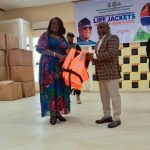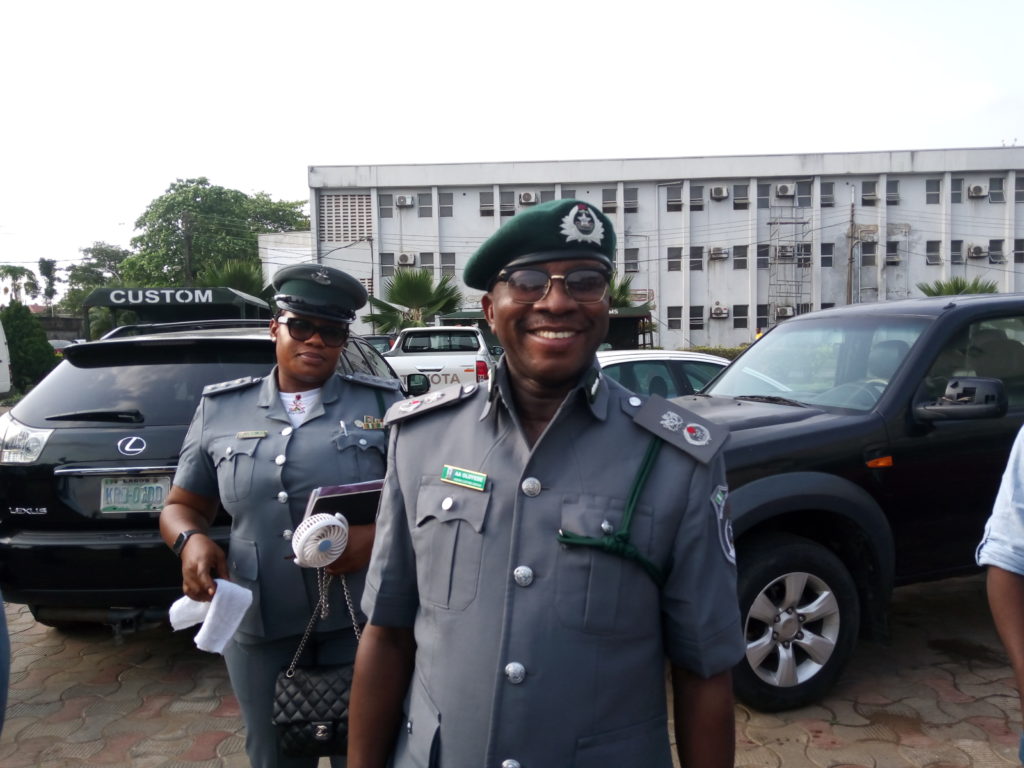Responsible reportage imperative for national security – Customs
- Trains Journalists on Language of international trade
- As NUJ Chairman speaks on effective media relations
(Report by Udeme Clement):
The Coordinator, Nigeria Customs Service (NCS), Zone ‘A’, Lagos, ACG Kaycee Ezekezie, has urged maritime Journalists reporting Customs activities to be factual, objective and always take cognisance of national security in disseminating information to the public.
She said this while addressing participants at the opening ceremony of a training programme organised by NCS for Journalists drawn from from print, electronic, and online media organisations.
The ACG, who spoke through her representative, Comptroller Sani Madugu, formally declared the programme open, stressing the need for Journalists to give credible information at all times.
The training, which was well thought-out and topics carefully selected entered the technical session immediately after the opening ceremony.
The first lecture presented by Customs Deputy National Public Relations Officer, DC Timi Bomodi focused on; ‘The Language of International Trade’.
DC Bomodi, who spoke extensively on international trade, said it involves movement of goods across the borders and member countries are expected to comply with the conditions of all trade agreements.
Speaking further, he explained the concept of FOB- Free on Board, where the seller has to fulfill his obligations to the buyer in delivering goods on board the ship. FAS- Free Along side ship, where the buyer is responsible for loading. the goods. CIF- Cost Insurance and Freight -the seller delivers the goods cleared for export on board the ship. Under this concept, Customs calculates its duty based on the cost of value.
CIP- Carriage and Insurance Paid to; the seller assumes all risks until the goods arrive at the final point of shipment.
Other concepts include DAP- Delivered at Place; DAT- Delivered at Terminal; DDP – Deliver Duty Paid, the seller delivers and pays all fees and taxes attached. LOC – letter of Credit; a letter of credit is issued by a bank to another bank showing payment made for a specific person, under specific conditions. PL – Packing List, certified list of all items in a container, which is an important document for Customs. PC – Product Certified; issued by the producer of the goods. PFI – Pro Forma Invoice; bill of sale used before actual payment is made, which spells out items under negotiation.
ISO Certificate – International Standards Organisation concerns quality assurance that is classified numerically. COC/SONCAP, certificate of conformity standard for goods coming into Nigeria. COO – Certificate of Origin.
CCOV; Combined Certificate of Value and Origin, attesting to origin of products and value as well.
BOL- Bill of Lading, a legal document showing that the carrier had received the goods as described, and he is obligated to deliver freight in good condition.
AWB- Air Way Bill, a receipt given by the international Airline for goods.
Shipping Manifest – details list of the cargoes.
SGD – Single Good Declaration.
FTA- Group of Countries coming together to form a single market.
FTZ – Free Trade Zone.
IATA- International Air Transport Association”.
Also, the Chairman, Nigeria Union of Journalists (NUJ), Mr Leye Ajayi, delivered a lecture on; ‘Media Relations/Best Practices.
He emphasised the need for Journalists to be timely and accurate in their news reporting techniques.
Speaking further, the NUJ Chairman warned against subjectivity and speculation. He advised reporters to always be objective in their reportage, especially on activities of Customs, which are often very sensitive issues.
Ajayi also urged Customs Public Relations Officers of various Commands to ensure that reporters have access to the right information, at the right time.
AC Anthony Ayalogu, spoke on; ‘AFCFTA- Understanding free trade and challenges of regulation.
According to him, “the objectives of AFCFTA include creating a single market for all. AFCFTA will enhance investments across member countries. It will create a continental Customs Union. It will expand intra-African trade. It will also enhance economic growth, sustainability and competitiveness”.
Another important lecture was given on; ‘fake news’
The presenter explained the dangers of fake news and implications on national security.
He stressed that fake news is usually created deliberately to misinform the public either for political or economic reasons.
The last lecture was presented by Comptroller Kunle Oleyede, on; ‘e-Customs – The future of trade facilitation’.
He informed that Customs modernisation is NOT concession.
At the end, five lectures were presented.
The training ended with vote of thanks by Customs National Public Relations Officer, DC Joseph Attah.
DC Attah enthused: “We thank CGC Hameed Ali for approving this training. Customs is deliberately reinventing itself.
The CGC is continuously reforming the Service, as we look forward to the Customs of our dream.
“We are looking for innovative technology that will remove all frictions and move the country forward for greater economic growth and development”.

From right : Comptroller Kunle Oleyede, after his lecture:

DC Attah during interview with reporters:

From left: Mr Asu Beks, DC Bomodi, PRO Onne Command and another officer after the training:

The NUJ Chairman, Lagos chapter:

Participants at the training :

AC Ayalogu making his presentation

 Impressive outing : Vee takes distant lead, Winnie, Melvino, others follow as NIMA releases week 2 voting result
Impressive outing : Vee takes distant lead, Winnie, Melvino, others follow as NIMA releases week 2 voting result  Brilliant performance : 19 Years Old OAU Student, Esther Olanrewaju Wins FOAMSC 2025
Brilliant performance : 19 Years Old OAU Student, Esther Olanrewaju Wins FOAMSC 2025  Vision of safe, secure, efficient inland water transportation : Oyetola flags off 3,500 life jackets distribution campaign in Lagos
Vision of safe, secure, efficient inland water transportation : Oyetola flags off 3,500 life jackets distribution campaign in Lagos  life-saving intervention : Oyetola expresses commitment of federal government to end unnecessary loss of lives on water transportation
life-saving intervention : Oyetola expresses commitment of federal government to end unnecessary loss of lives on water transportation  NPA, Dangote to deepen maritime industry growth, expand export operations
NPA, Dangote to deepen maritime industry growth, expand export operations 









